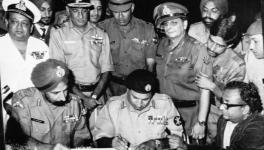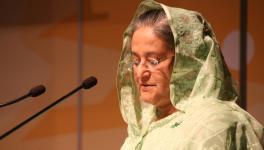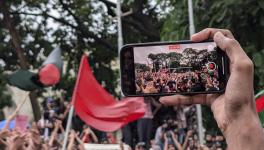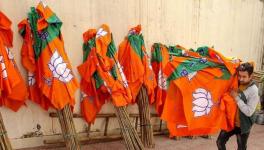Bangladesh: ‘Bangabandhu’s Clemency to Pro-Pak People is Creating Problems Now’
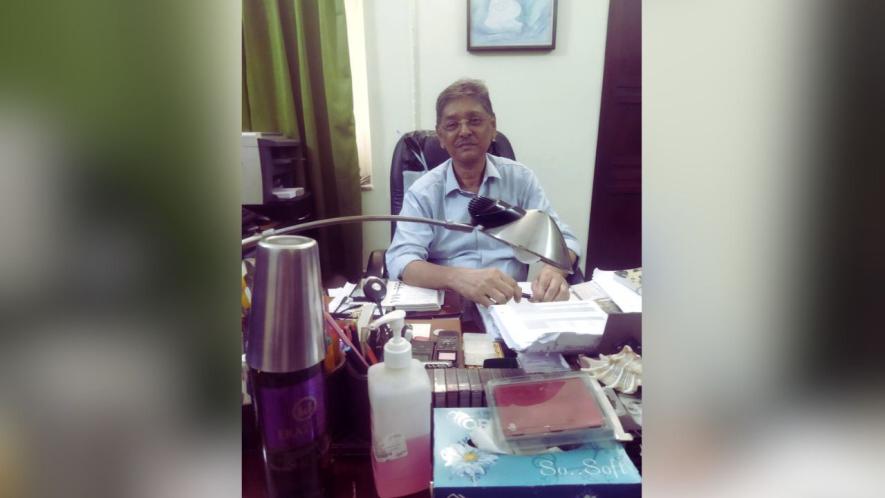
Abhijit Dasgupta, former DG, Doodarshan Kendra, Kolkata, and a veteran journalist, has roots in Bangladesh.
Abhijit Dasgupta, 79, is a veteran journalist and former Director General of Doordarshan Kendra, Kolkata. He has the unique distinction of covering the freedom struggle of Bangladesh in 1971 as well closely watching the ongoing anti-quota turmoil in the neighbouring country. Newsclick spoke with Dasgupta, who has roots in Bangladesh, has won various awards and has written a book on the country's freedoms struggle, on the state of politics in Dhaka then and now, and the changes he has seen in these 53 years. Edited excerpts:
Sandip Chakraborty: What was your experience as a journalist during 1971 Bangladesh ‘War of Liberation’?
Abhijit Dasgupta: I was working with The Statesman newspaper that time. On March 26, 1971 evening, Sadhan Banerjee, my senior colleague, nicknamed ‘Charlie’, who used to call me ‘Bangal’ (a colloquial term to denote residents with roots in Bangladesh, which was then East Pakistan) told me to go upstairs and watch the condition of "your country".
At that time, news was trickling in about Dhaka being encroached upon by the Pakistan Army, who was killing unarmed ‘secular’ intellectuals and students, both Hindus and Muslims. At that time, we used to have an ‘adda’ group (friends’ chat group) which decided to cross into Bangladesh. On March 28, we started moving toward the border where we were told not to proceed further. We went back about 2 kilometers and sat in a tea stall.
There we enquired if we could somehow manage to go inside the then East Pakistan, as we were journalists. The tea stall owner answered in the affirmative and sent a small boy (who used to work in his tea stall and use to cross over from East Pakistan regularly) to help us through.
We crossed the paddy fields for 2-3 kms and crossed the border. The boy accompanying us showed the way ahead and parted ways once we reached the border. Thereafter, we continued our journey.
After walking for another 2-3 km, we suddenly heard the command to “Halt”. That was the first time we realised that we were facing a column of ‘muktijoddhas‘ (liberation warriors), who looked impoverished, some wearing pant-shirts and some bare-chested. They were carrying bamboo sticks and ballams (iron tipped sticks) as their only weapons. Amongst the muktijoddhas, was a policeman who has deviated from his ranks and joined them. That was the first time I saw the muktijoddhas and saw the Bangladesh flag, which was slightly different from the present-day flag. It had a map of Bangladesh on it. That day we had to return from the border area, but after distributing some medicines to the muktijoddhas.
Before Bangladesh was born, I crossed into East Pakistan 14 times, mostly for media-related work.
My main operational area was Jessore, Khulna, Rajshahi,and the Pabna area. I saw dogs eating human bodies, bodies of Pakistan army jawans lying on tanks. We even went to the war zones in Rajshahi, where bullets were flying over our heads.
SC: What was your impression about ‘Bangabandhu’ (Sheikh Mujibur Rahman)?
AD: We could feel that throughout that country, there was a euphoria regarding Bangabandhu and his declaration of the ‘war of liberation’. He called upon ‘mothers and sisters’ to build fortresses at home and also participate in the struggle.
Here it is imperative to mention that the culture, food habits and language of both sides of Bengal was one. The bifurcation was only political, carried out by politicians. I have seen euphoria about Bangabandhu in this part of Bangla also. The Hindu-Muslim divide is an injected divide, the people are one.
My one and only home was in Dhaka (now Bangladesh’s capital) at Wari. My father was the captain of Wari Club. Like gangrene, communalism was injected into the people.
SC: What is your view of the present situation in Bangladesh?
AD: In 1971, Bangabandhu gave clemency to those who were pro-Pakistan, which is creating problems now. Violence is being instigated. Had severe punishment been accorded to the Razakars (traitors) and the Jamaatis then, this situation would not have arisen.
SC: Can you elaborate?
AD: A lot of what is happening in Bangladesh today is being instigated (by some YouTubers in foreign soil). In 2018, Sheikh Hasina (Awami League leader and Prime Minister) had abolished the 30% job quota (for descendants of freedom fighters). In 2021, the High Court declared that order as null and void. This triggered the protests.
The muktijoddhas’ contribution (to Bangladesh’s independence) is immense. This generation does not know about their contribution. Traditional documentaries have not reached the targeted audience. Who does not want development? I feel some YouTubers from foreign soil are instigating the violence. Bangladesh television was set on fire. No student would do that. The jail-break was instigated, not by students, but by arsonists who do not want their country to progress.
SC: Are you saying that communication to the targeted segment (students and youth) is failing?
AD: What do the protesting students want? They want secure jobs. They can be given a warning and let off. The main issue is, what took so long for the violence to begin? This is a mobile (phone) generation. The instigation for violence was generated on mobile phones.
SC: Have you seen Shyam Benegal’s film on Sheikh Mujib? What’s your view?
AD: Shyam Benegal’s film is not too eye-catching. It lacks Benegal’s touch, though statistics and all are good. It could have been handled in a much better way.
SC: How do you see Bangladesh then and now?
AD: The 1971, the devastation by the Pakistani army was like a wild boar creating mayhem.
In 2024, the violence and riots are instigated. Whether rubber bullets should have been fired is a different story. (Over 200 people have died during the protests till now).
Bangladesh has seen visible development. A person from a village can come to Dhaka for work and return the same day, due to the Padma Setu, the Metro rail, the flyovers, the highways. This cannot be overlooked.
But, in villages, there are groups that are anti- progressive in nature. This issue should be addressed. Our car driver said his daughter wants to study dance and music, but village people are not letting her pursue a career in that field. Can you imagine that a girl whose parents support her aspirations, cannot pursue a career due to obstruction from village people? Such is the situation in many parts of that country.
Get the latest reports & analysis with people's perspective on Protests, movements & deep analytical videos, discussions of the current affairs in your Telegram app. Subscribe to NewsClick's Telegram channel & get Real-Time updates on stories, as they get published on our website.











